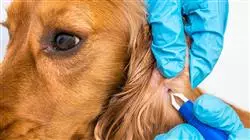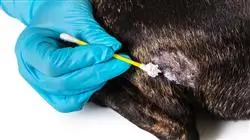University certificate
The world's largest faculty of veterinary medicine”
Introduction to the Program
Acquire mastery of the latest techniques and advances in the care of Dermatological and Ophthalmological Emergencies in Small Animals with this Postgraduate diploma of high educational intensity"

In emergency medicine there is a series of understandings, procedures and techniques which are common in the majority of cases, independent of the specialty or specialties involved in each case.
In the case of dermatologic emergencies, care must often be immediate and appropriate, whether the patient can be seen in primary care or referred. Thus, triage, assessment and an approach that takes into account all the possible systemic implications of this situation are essential.
In the ophthalmologic area, the veterinarian may face complex situations. Delicate, tight and accurate intervention can mean the difference between preserving or losing vision in a short interval of time. However, not all veterinarians have the necessary qualifications to intervene successfully.
In this Postgraduate diploma, we develop the knowledge that the professionals need to be able to face this type of emergencies with safety, promptness and success. A comprehensive overview of the most specialized advances and developments in these areas of work. In short, it is a complete tour of all the areas of knowledge needed to perform quality emergency care.
Get a complete training in Dermatological and Ophthalmologic Emergencies In Small Animals with this highly effective educational Postgraduate diploma"
This Postgraduate diploma in Dermatological and Ophthalmologic Emergencies In Small Animals contains the most complete and up-to-date scientific program on the market. The most important features include:
- The latest technology in online teaching software
- Intensely visual teaching system, supported by graphic and schematic contents, easy to assimilate and understand
- Practical cases presented by practicing experts
- State-of-the-art interactive video systems
- Teaching supported by telepractice
- Continuous updating and recycling systems
- Autonomous learning: full compatibility with other occupations
- Practical exercises for self-assessment and learning verification
- Support groups and educational synergies: questions to the expert, debate and knowledge forums
- Communication with the teacher and individual reflection work
- Content that is accessible from any fixed or portable device with an Internet connection
- Supplementary documentation databases are permanently available, even after the program
A Postgraduate diploma who will train you with a learning system focused on practice, so that you can apply the knowledge you acquire almost immediately"
The teaching staff includes teaching professionals who contribute their experience to this educational program, as well as renowned specialists belonging to leading societies and prestigious universities.
Thanks to its multimedia content developed with the latest educational technology, they will allow the professionals a situated and contextual learning, that is to say, a simulated environment that will provide an immersive learning programmed to prepare in real situations.
This program is designed around Problem-Based Learning, whereby students must try to solve the different professional practice situations that arise throughout the program. For this purpose, the physicians will be assisted by an innovative interactive video system developed by renowned experts in the field of veterinary medicine who have extensive teaching experience.
With the experience of veterinarians specialized in the different branches of small animal veterinary emergencies"

This Postgraduate diploma in Dermatological and Ophthalmologic Emergencies In Small Animals is developed using the best teaching approaches to enable you to learn dynamically and effectively"
Why study at TECH?
TECH is the world’s largest online university. With an impressive catalog of more than 14,000 university programs available in 11 languages, it is positioned as a leader in employability, with a 99% job placement rate. In addition, it relies on an enormous faculty of more than 6,000 professors of the highest international renown.

Study at the world's largest online university and guarantee your professional success. The future starts at TECH”
The world’s best online university according to FORBES
The prestigious Forbes magazine, specialized in business and finance, has highlighted TECH as “the world's best online university” This is what they have recently stated in an article in their digital edition in which they echo the success story of this institution, “thanks to the academic offer it provides, the selection of its teaching staff, and an innovative learning method aimed at educating the professionals of the future”
A revolutionary study method, a cutting-edge faculty and a practical focus: the key to TECH's success.
The most complete study plans on the university scene
TECH offers the most complete study plans on the university scene, with syllabuses that cover fundamental concepts and, at the same time, the main scientific advances in their specific scientific areas. In addition, these programs are continuously being updated to guarantee students the academic vanguard and the most in-demand professional skills. In this way, the university's qualifications provide its graduates with a significant advantage to propel their careers to success.
TECH offers the most comprehensive and intensive study plans on the current university scene.
A world-class teaching staff
TECH's teaching staff is made up of more than 6,000 professors with the highest international recognition. Professors, researchers and top executives of multinational companies, including Isaiah Covington, performance coach of the Boston Celtics; Magda Romanska, principal investigator at Harvard MetaLAB; Ignacio Wistumba, chairman of the department of translational molecular pathology at MD Anderson Cancer Center; and D.W. Pine, creative director of TIME magazine, among others.
Internationally renowned experts, specialized in different branches of Health, Technology, Communication and Business, form part of the TECH faculty.
A unique learning method
TECH is the first university to use Relearning in all its programs. It is the best online learning methodology, accredited with international teaching quality certifications, provided by prestigious educational agencies. In addition, this disruptive educational model is complemented with the “Case Method”, thereby setting up a unique online teaching strategy. Innovative teaching resources are also implemented, including detailed videos, infographics and interactive summaries.
TECH combines Relearning and the Case Method in all its university programs to guarantee excellent theoretical and practical learning, studying whenever and wherever you want.
The world's largest online university
TECH is the world’s largest online university. We are the largest educational institution, with the best and widest online educational catalog, one hundred percent online and covering the vast majority of areas of knowledge. We offer a large selection of our own degrees and accredited online undergraduate and postgraduate degrees. In total, more than 14,000 university degrees, in eleven different languages, make us the largest educational largest in the world.
TECH has the world's most extensive catalog of academic and official programs, available in more than 11 languages.
Google Premier Partner
The American technology giant has awarded TECH the Google Google Premier Partner badge. This award, which is only available to 3% of the world's companies, highlights the efficient, flexible and tailored experience that this university provides to students. The recognition as a Google Premier Partner not only accredits the maximum rigor, performance and investment in TECH's digital infrastructures, but also places this university as one of the world's leading technology companies.
Google has positioned TECH in the top 3% of the world's most important technology companies by awarding it its Google Premier Partner badge.
The official online university of the NBA
TECH is the official online university of the NBA. Thanks to our agreement with the biggest league in basketball, we offer our students exclusive university programs, as well as a wide variety of educational resources focused on the business of the league and other areas of the sports industry. Each program is made up of a uniquely designed syllabus and features exceptional guest hosts: professionals with a distinguished sports background who will offer their expertise on the most relevant topics.
TECH has been selected by the NBA, the world's top basketball league, as its official online university.
The top-rated university by its students
Students have positioned TECH as the world's top-rated university on the main review websites, with a highest rating of 4.9 out of 5, obtained from more than 1,000 reviews. These results consolidate TECH as the benchmark university institution at an international level, reflecting the excellence and positive impact of its educational model.” reflecting the excellence and positive impact of its educational model.”
TECH is the world’s top-rated university by its students.
Leaders in employability
TECH has managed to become the leading university in employability. 99% of its students obtain jobs in the academic field they have studied, within one year of completing any of the university's programs. A similar number achieve immediate career enhancement. All this thanks to a study methodology that bases its effectiveness on the acquisition of practical skills, which are absolutely necessary for professional development.
99% of TECH graduates find a job within a year of completing their studies.
Postgraduate Diploma in Validation of New Methodologies and Industry Digitization in Food Safety Management
Due to the nature of their pathological processes and their frequent involvement in companion and production animals, dermatological and ophthalmological emergencies currently account for a large part of veterinary emergency care services. This situation has generated a growing interest, on the part of the public and private sector, in the recruitment of veterinary medicine professionals specialized in this area of care. Understanding the academic update as an aspect of vital importance for an adequate occupational development in the sector, in TECH Global University we have designed our program of Postgraduate Diploma in Validation of New Methodologies and Industry Digitization in Food Safety Management. This postgraduate course will address the practical management of microbiological cultures, microscopic examination of cerumen, acetate tapes and other new diagnostic procedures developed around the care of dermatological emergencies. Likewise, we will deepen in the modernization of the following aspects: knowledge of the new ways of treatment in cases of pyotraumatic dermatitis; and the identification of the different diagnostic alternatives used in the identification of anterior dislocation of the crystalline lens.
Study an online Postgraduate Diploma course
The pressing contexts that characterize the processes of ophthalmologic and dermatologic emergency care highlight this sector of veterinary medicine as one of the most demanding with respect to the degree of knowledge and ability of its professionals. In our program you will learn about the new scopes and opportunities of the sector, contemplating the role of the veterinarian in the constant development of the area. Likewise, in this postgraduate course you will delve into the updating of the following topics: the identification of the different protocols to follow in the emergency treatment of patients with severe burns; and the knowledge of the new therapeutic alternatives used in the management and care of cases of acute blepharospasm.







